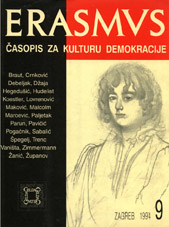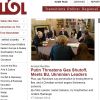
The Pavan for Bosnia
Pavana za Bosnu
Noel Malcom: Bosnia - a short history, Macmillan, London 1994.
More...
Noel Malcom: Bosnia - a short history, Macmillan, London 1994.
More...




Odlomak iz zaključnog poglavlja
More...
Abstract. In her contribution, Nadège Ragaru investigates what she calls a paradox: The wars in Yugoslavia provoked a wide array of citizen initiatives, petitions, and demonstrations. Yet, their impact on French diplomacy was limited. The French government remained opposed to the idea of military intervention until the 1995 elections. The author examines three aspects of this paradox: First, the encounters between Paris and Sarajevo resulted in missed opportunities. For the French intellectuals the conflict turned into an arena where several prominent figures tested their authority, attempted to bolster their legitimacy, and introduced the divisions that structure their competing intellectual fields. Second, while “local voices” were solicited by the media and inaugurated “the era of the witness” (Wieviorka), their selective use tended to obscure the conflict. Finally, the wars represented a critical moment for academics with a Yugoslav background. Many had not worked on Yugoslav issues before and witnessed powerlessly as former academic solidarities in France and Yugoslavia collapsed. This situation in turn impeded a more adequate analysis of the Yugoslav wars.
More...Abstract. This article analyses how the ICTY has changed the way we talk about the war in the former Yugoslavia and about mass crimes. The often alleged Nuremberg legacy is misleading for assessing the ICTY’s significance, both in historiographical and in political terms. First, it led to disproportionate expectations towards the Hague Tribunal. Those expectations were all the greater since the ICTY ended up being in charge of settling political and international responsibility, even though it does not address such responsibilities. The expectation that the ICTY also should lead to liberal democracy is also misleading and neglects the Yugoslav European legacy in terms of international law and social practices. This Yugoslav legacy can be observed at the municipal level, which is particularly significant to assess the ICTY effects and significance: criminals and victims are mainly defined at this level. The Hague tribunal has been able to move away from the Nuremberg model by paying attention to local and regional factors in a less centralized vision of the organization of mass crimes. International justice can become a norm and mediation among members of the same municipality. Thus, international law may be that of ordinary people, governing relations between the citizen and the foreigner, but also between citizens of the same country. International law can be a domestic standard and point of reference. This is what is called here the “justice of peoples”.
More...Abstract. Which concepts should we use to analyze the (post-)Yugoslav wars of the 1990s? Which approaches have been prevalent up to now? This paper offers an overview of possible approaches to these problems. Among others, it addresses the following questions: Should the enormous violence that took place be conceptualized as a by-product of the collapse of the socialist ethno-federal structure and the transformation of its institutions since 1989, which, from a global perspective, led to several wars in the post-socialist space? Or should the violence be understood as a particular product of Yugoslavia’s turbulent history in the 20th century? Is the so-called “ethnic-turn” that took place at the end of the 1980s really the key to understanding the violence? Or would it be better to focus on the inner dynamics which emerged in each of the different “sites of violence”, within the framework of new social and political circumstances? Finally, how should we conceptualize the complex relationship between the local dynamics that led to the violence and the influence of external (inter)national factors?
More...This essay examines the “prehistory” of the relations between German and Yugoslav intellectuals concerning the war in Yugoslavia. In order to understand the “muteness” of German left-wing intellectuals regarding the violence in Yugoslavia, it is necessary to look at the relations during the preceding decades. Such a look reveals that there were contacts and relationships between Yugoslav left-wing dissidents and German left-liberal intellectuals after 1968 and throughout the 1970s and 80s. Against the background of muteness, it is even more surprising that in the 1980s a journal existed that was co-edited by German, North-American and Yugoslav intellectuals. This makes it all the more difficult to answer the question of why, despite such close contact, muteness emerged. The concluding section develops a perspective for further research and argues that attention should be paid to the theoretical framework through which the developments in Yugoslavia were perceived by German intellectuals.
More...Abstract. The author focuses on the following paradox: while on the one hand there was an urgent need for expertise to explain the events in Yugoslavia, on the other hand the institutionalized knowledge of Yugoslavia was actually reduced. As a result the German public was left with the opinions of self-proclaimed Yugoslavia experts in the media. In general, a relevant part of the scientific community shared the conviction regarding the end of nations and the nation-state and claimed that they were merely discursive constructions. But at the same time, it was assumed that in Yugoslavia it was primarily national collectives that fought each other. Finally, consciousness about nations as “imagined communities” did not lead to a better understanding of the violence. On the contrary, the author argues that after organizational foundations for research were cut, critiques of the essentialist concepts that were used to explain the events became rare.
More...Abstract. The European public perceived the wars in the former Yugoslavia as a “shock of violence” which provoked public and intellectual debates that went far beyond the question of how the conflicts could be ended. Three fields of these debates are discussed in the following article: First, the wars contributed to a revision of the conventional self-perception of “the West” and finally eroded what Hans Joas has called the “dream of a peaceful modernity”. Second, the wars changed our perceptions of violence and made us more sensitive to forms of violence that had been neglected or marginalized, such as sexual violence and “ethnic cleansing”. This greater sensitivity also contributed to an increasing concern for the significance of morality in political and, in particular, military action. Third, the wars produced intellectual reactions, which, particularly in Germany and France, reflected partly the different roles intellectuals have played in those societies.
More...Abstract. While public opinion has often perceived the Yugoslav wars of the 1990s as ethnic wars, the majority of academic circles in the West has opposed this view. Advocating a more nuanced approach to the ethnic dimensions of the Yugoslav wars, the author reexamines three major and interrelated issues: the centrality of the state as a stakeholder and as an actor, the evolution of ethno-nationalist mobilization, and the crisis of komšiluk understood as a system of interethnic coexistence.
More...
Keywords: Ukraine; education; schools; Kyiv; developers; refugees; Donetsk;
Years of sprawl, along with developers’ empty pledges to build private schools, are creating a crisis in the city’s suburbs. Second in an occasional series. This is the second in an occasional series of articles on the implications of private education in TOL’s region.
More...
Keywords: Kazakhstan; Ikan; Ak Bulak; corruption; water;
A massive project to bring potable water to southern Kazakhstan is drained by corruption and incompetence.
More...
Keywords: Ukraine; Crimea; tatars; mejlis; fuele; Poroshenko; EU; floods; Bosnia; Serbia; Croatia; Slovenia; Uzbekistan; Karimova; Roma; Bulgaria; Russia; Romania; Slovakia;
Plus, three countries are faulted over Roma polices, and an appeal to help Uzbekistan leader’s detained daughter. Around the Bloc is TOL's daily digest of the important, the trivial, the tragic, the weird, and the sober from its coverage region.
More...Keywords: Introduction
For the 90th Anniversary of the Hungarian Statistical Association
More...Keywords: Enyedi György; vidék; a mezőgazdaság; falusi települések kutatása
The recently deceased academician Mr. György Enyedi devoted the first quarter century of his long research carreer by researching rural areas, agricultural geography and rural settlements. As a closure of this period he wrote a book titled The Fate of Hungarian Villages, which was published in 1980. At that time Hungarian countryside was over a quite successful decade. It is an extremely interesting and illuminating task to read again in details the work of such a great scientist after three decades. It can be experienced how many useful conclusions are still valid from the study, which is based on very authentic data and rich in geographical analyses. Regarding its approach, methods and clear and simple scientific wording it is considered an up-todate work. Furthermore it is sure, that the provincial – rural processes that had taken place then, are newly topical.
More...